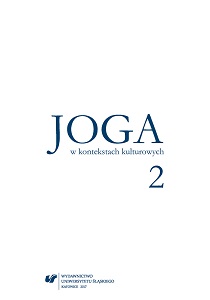Nieśmiertelna dusza, rytmiczne oddychanie i posłannictwo narodu. O podręczniku Wincentego Lutosławskiego
The immortal soul, rhythmical breathing and the mission of the people. Wincenty Lutosławski’s manual
Author(s): Anna Gomóła
Subject(s): Social Sciences, Sociology, Health and medicine and law
Published by: Wydawnictwo Uniwersytetu Śląskiego
Keywords: a yoga manual; Rozwój potęgi woli; Wincenty Lutosławski; the will
Summary/Abstract: The article is devoted to the book entitled Rozwój potęgi woli by Wincenty Lutosławski (1863–1954), a philosopher and a national activist. The book, considered the first Polish yoga manual, appeared three times in print during the author’s lifetime: in 1909, 1910and 1923. If one is to study the problem of Lutosławski’s attitude to yoga – and the authorused to change his attitude – one must take into account the chronological sequence of editions.In Rozwój potęgi woli Lutosławski treated yoga as a method and not as a main educationalgoal, although he admitted that the exercises which were presented enabled him to recuperate. He crafted scholarly reflection about yoga by means of the study of a few people who managed to “remodel and transform their bodies”, but he was interested above all in the problem (which was relevant at that time) of the will of man in the context of his capabilities. He also planned to prepare an extended edition of his work (in two volumes), but after the first edition published in 1909 achieved success he decided to publish further editions which featured slight modifications (1910).In order to familiarise the Polish reader with the yogic system which arose in other cultural traditions he argued that Polish elements and Hindu elements, even though they were apart geographically, shared points of convergence. The fragment which is devoted to this is featured in all editions. However, in the edition which was published in 1923 its tenor was undermined by three new chapters (Fasting, Prayer, Divine service ) and the Preface to the Third Edition, in which the author explained that he agreed to Rozwój potęgi woli to be published on condition that the earlier text would be extended. The Preface to the Third Edition lacks emphasis of similarities; it emphasises differences; Lutosławski warned his Polish readers against choosing methods of action which are peculiar to other cultures, for these methods would prevent the realisation of the thing which he referred to as the national mission. In the Divine service chapter he stated that the yoga of the Hindu is not appropriate for Poles. The preface and the last three chapters of the third edition undermine the value of the recommendations provided by the author in the chapters which were developed at the beginning of the 20th century. In spite of this, due to his activities associated with publications and lectures, Lutosławski influenced the interest in yoga in the inter-war period.
Book: Joga w kontekstach kulturowych 2
- Page Range: 93-120
- Page Count: 28
- Publication Year: 2017
- Language: Polish
- Content File-PDF

